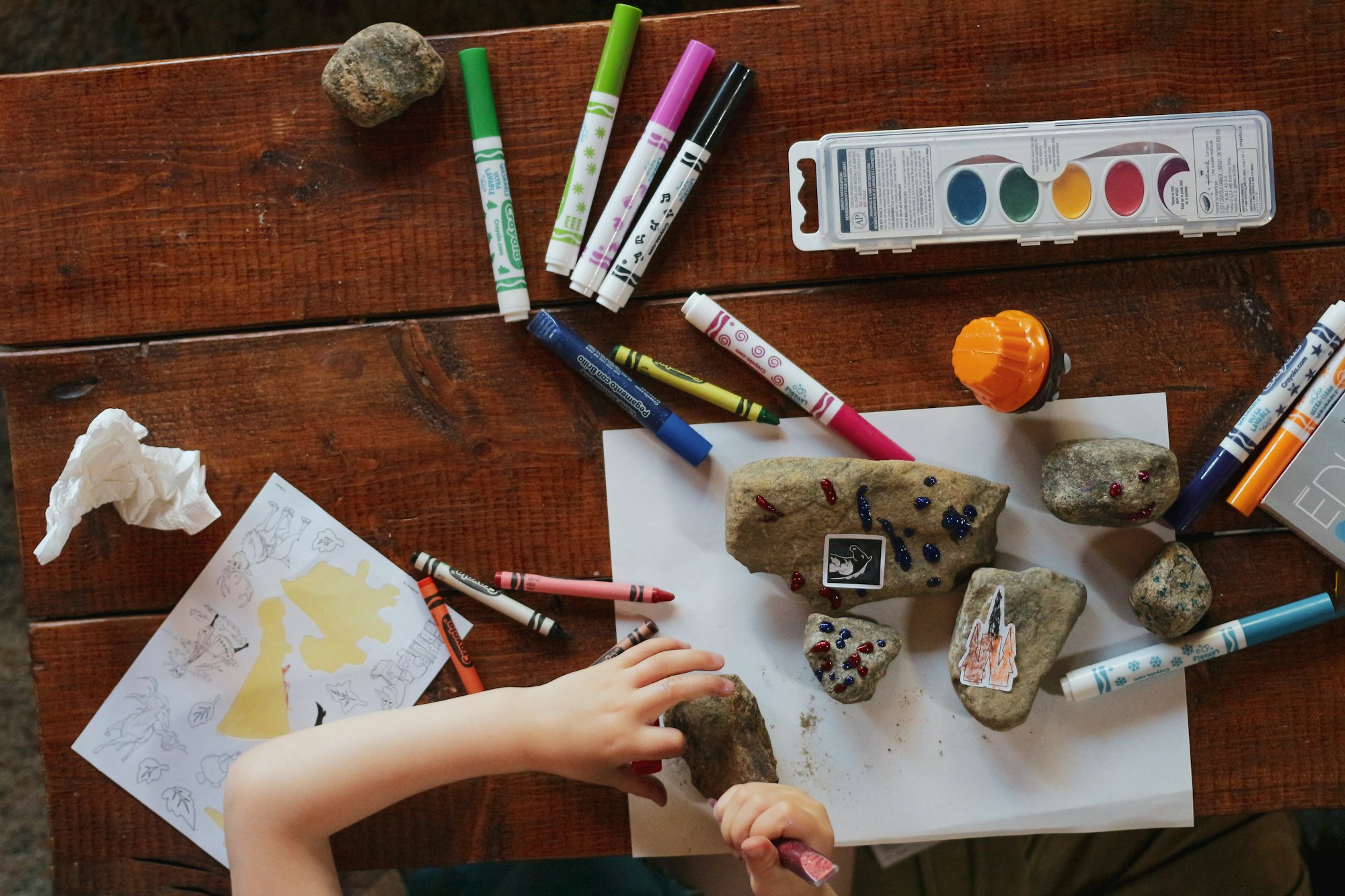Deschooling and Unschooling

When I was first wading into the world of homeschooling (with more than a little trepidation), one thing that threw me was two terms I didn’t understand, and kept getting mixed up: deschooling and unschooling. They sound very similar, almost interchangeable, and they’re not! In case you find yourself in the same boat, here’s the lowdown:
Deschooling
Deschooling is a temporary phase, typically when making a transition from a brick & mortar school to homeschooling. It’s about leaving the old ideas about learning behind, so you can have a blank slate for creating a new approach to learning that’s tailored to the kid.
Think of it this way: what if your whole life, every meal came from a banquet-style buffet? You’d be accustomed to staying seated until your table’s turn came up, getting in line, picking up a plate and silverware, making your selections from the options at the buffet, there’d probably be some particular protocol about getting seconds that you’d know really well, etc., etc.
How would it go if all of a sudden you were eating meals at home for the first time? If the banquet was all you knew, you would probably go through an awkward period of recreating the banquet hall at home, and retain all of those familiar protocols, because That’s What Eating Looks Like. But so many of those protocols aren’t as much about getting you fed as they are about getting a lot of people fed in an orderly way. If it’s just you and the food, it’s all unnecessary overhead.
This happens A LOT with folks when they first start homeschooling. They try to recreate the classroom at home, because that’s what they think learning looks like, that’s what they know. Over time, they figure out that a lot of the trappings of school are completely unnecessary at home, but that learning curve can be painful.
Further, many families start homeschooling because something has gone really wrong in their school experience. There can be a lot of pain, fear, negative self-identity, demoralization, and distrust. Before the brain can get into a good learning mode again, those feelings have to be addressed.
Deschooling is giving you and your kid a break. It’s about hitting a great, big reset button, to make it easier to drop those brick & mortar expectations and start to see learning with fresh eyes. It also gives you a chance to build a really strong connection with your kid, an important foundation for homeschooling. It’ll look different for different families, because different people have different ways of restoring themselves. But in general, anything that’s about stopping the external expectations about learning and instead getting a chance to mentally restore and find your own curiosity is the goal.
You might see folks making recommendations about how long to deschool (e.g., “one month for every year your kid’s been in school”), but honestly I think that’s hooey. Instead, simply consider that many families have taken a nice, long pause in attempts to direct learning, and they’ve found it to be beneficial, and you might, too.
(You don’t have to deschool. We didn’t [I wanted to, Wanda didn’t, she wanted to get the show on the road], and we turned out fine. But I think it’s worth considering.)
Unschooling
Unschooling isn’t a phase, it’s a long-term approach to how one can homeschool: child-led learning. Children are naturally curious, and do their most powerful learning when they’re following their own intrinsic curiosity, rather than an external direction to learn about a topic they didn’t choose. Unschooling is about learning how to support the child’s natural curiosity, to be a coach for what they want to do, and not get in their way. Unschooling recognizes that people can’t help but learn—we’re wired for it, learning is always happening. The more one is immersed in a rich, full, interactive life, the more learning is possible—and being tethered to prescribed learning can get in the way of that.
In my recent nerd-fest post about the science of learning to read, I specified the tools I’m using. You’ll notice that the beefiest learning wasn’t coming from curricula, but instead from just doing an absolute shit-ton of reading, both together and independently. I like my reasons for choosing to bolster her learning through the curricula I chose, but don’t mistake what’s really happening: the meat of her learning to read isn’t coming from formal teaching.
I’m not the best source for learning more about unschooling, as we aren’t doing it ourselves.* Instead, here’s a blog post from last year, written by a local San Francisco homeschooling father who explains how unschooling works (and how the pandemic has made it look quite different, temporarily). (I’ve not yet met Hamilton, our paths will probably cross at some point. SF is always so big, and so small!) Unschooling is a very popular approach, and there are tons of books and support communities out there if you’d like to learn more. (I don’t pay terribly close attention to it, but I kinda like the Slightly Less Radical Unschoolers Facebook group.)
I know plenty of families who are unschooling. As you can probably tell, I’ve become awfully passionate and nerdy about pedagogy, and I have *zero* qualms about the education these unschooled kids are getting. They’re awesome, they’re knowledgeable, they’re bright, they’re curious, and they have all kinds of solid life skills that others learn much later in life.
* We aren’t unschooling, but being child-led is a strong thread though a lot of homeschooling approaches. I’m quick to set my lesson plan for the day aside when she’s found her own trail of learning, ‘cause that’s gold. We have many, many unschool-y moments. But “unschooling” typically is referring to a more complete approach.

